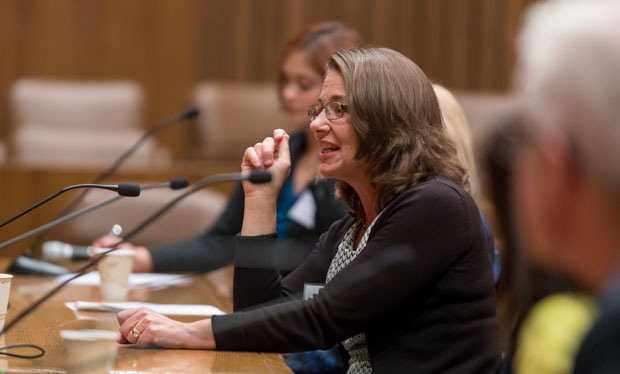Grubhub Trial Judge Leaves Big Labor Question Unresolved Amid 'Dynamex' Dust-up
U.S. Magistrate Judge Jacqueline Scott Corley says the California Supreme Court's big worker classification ruling raises substantive questions, but she declined to make any formal decision on applying it retroactively.
November 29, 2018 at 05:18 PM
4 minute read
 Magistrate Judge Jacqueline Scott Corley speaks at a candid Federal Bar Association event highlighting some judges and court procedures.
Magistrate Judge Jacqueline Scott Corley speaks at a candid Federal Bar Association event highlighting some judges and court procedures.
A San Francisco judge acknowledged a pivotal California Supreme Court decision would affect the outcome of a closely watched labor fight between Grubhub Inc. and a former delivery driver but declined to say whether the decision should be applied retroactively, a key question that gig companies want answered.
Magistrate Judge Jacqueline Scott Corley of the U.S. District Court for the Northern District of California issued an opinion Wednesday in response to a question from plaintiffs attorneys who contend Grubhub is misclassifying its workers as contractors and not employees. Corley in February ruled for Grubhub, and the case, brought by a driver named Raef Lawson, is now pending before the U.S. Court of Appeals for the Ninth Circuit.
The distinction between independent contractors and employees—who are entitled to benefits, workers' compensation and other rights—is key in the mountain of lawsuits filed against gig companies with workforces made up largely of freelance workers who set their own schedules.
Lawson's case was on appeal when the California Supreme Court in April embraced a more rigid standard that makes it harder for companies to classify their workers as contractors. The new standard, known as the ABC test, has the potential to upend the business model of gig economy companies, attorneys have said.
Lawson's attorney Shannon Liss-Riordan has argued the Grubhub case should be remanded from the Ninth Circuit to the trial court because the new standard, announced in the case Dynamex Operations West v. Superior Court, would change the outcome of the February trial.
Corley, in her ruling Wednesday, said she agreed that the new standard under Dynamex would change the outcome of the trial but said she will not settle the larger question at play: whether the decision applies retroactively. Companies, including Grubhub, are fighting in court to stop the ruling from being applied to older cases.
“The pivotal question, then, is the retroactive effect of the Dynamex Court's adoption of the ABC test to determine worker classification,” Corley wrote. “Even if the decision establishes a new rule of law, if there was no prior rule to the contrary the decision applies to cases not yet final, including cases on appeal.”
After its April ruling, the California Supreme Court denied, without explanation, various employer groups' requests to clarify whether Dynamex applies only prospectively. Corley said the justices' order, however, is not definitive.
Corley acknowledged the question raises a “substantial issue” but declined to offer insight into how she would rule and said the court lacked the jurisdiction while the case is on appeal in the NInth Circuit. She notes that “there is some suggestion that the California courts will follow this general rule [of retroactivity] as to Dynamex.”
Grubhub's lawyers at Gibson, Dunn & Crutcher argued in court papers last month that California courts “decline to make new rules retroactive where doing so would violate the parties' due process rights.” The company said that courts “routinely 'decline to follow [the] standard rule when retroactive application of a decision would raise substantial concerns about the effects of the new rule on the general administration of justice, or would unfairly undermine the reasonable reliance of parties on the previously existing state of the law.”
Gibson Dunn partner Michele Maryott, a lawyer for Grubhub, did not immediately respond to request for comment Thursday.
Liss-Riordan said in an email Thursday that she plans to proceed with briefing and argument in the Ninth Circuit, and she will ask the appeals court to reverse the trial court's ruling.
“In light of the fact that we have now begun the briefing at the Ninth Circuit in this case, I don't think there would be any significant saving of time in asking that the case be sent back now to the trial court, rather than just have it decided at the Ninth Circuit,” she said.
Read more:
Will California's New Worker Classification Test Be Applied Retroactively?
Calif. Supremes Embrace Worker-Friendly Classification Test.
In Bellwether Gig Economy Case, Judge Rules Grubhub Driver Is Not an Employee
This content has been archived. It is available through our partners, LexisNexis® and Bloomberg Law.
To view this content, please continue to their sites.
Not a Lexis Subscriber?
Subscribe Now
Not a Bloomberg Law Subscriber?
Subscribe Now
NOT FOR REPRINT
© 2025 ALM Global, LLC, All Rights Reserved. Request academic re-use from www.copyright.com. All other uses, submit a request to [email protected]. For more information visit Asset & Logo Licensing.
You Might Like
View All
Eight Years On, A&O Shearman’s Fuse Legal Tech Incubator Is Still Evolving
4 minute read
Law Firms Look to Gen Z for AI Skills, as 'Data Becomes the Oil of Legal'

Davis Wright Tremaine Turns to Gen AI to Teach Its Associates Legal Writing
4 minute read
Husch Blackwell Hires Former Adobe Counsel to Oversee AI Advisory Offering
3 minute readTrending Stories
- 1Chinese Firms Hire Partners from Kirkland and Paul Hastings in Hong Kong
- 2'He Used Some Colorful Language': Yale Defamation Case Survives
- 3Man Charged in Daylong Shooting Rampage in Memphis Is Serving as His Own Lawyer
- 4Counterpoint: FLA Is Committed To the Success of Legal Professionals
- 5Pa. Superior Court Rules Pizza Chain Liable for Franchisee Driver's Crash
Who Got The Work
J. Brugh Lower of Gibbons has entered an appearance for industrial equipment supplier Devco Corporation in a pending trademark infringement lawsuit. The suit, accusing the defendant of selling knock-off Graco products, was filed Dec. 18 in New Jersey District Court by Rivkin Radler on behalf of Graco Inc. and Graco Minnesota. The case, assigned to U.S. District Judge Zahid N. Quraishi, is 3:24-cv-11294, Graco Inc. et al v. Devco Corporation.
Who Got The Work
Rebecca Maller-Stein and Kent A. Yalowitz of Arnold & Porter Kaye Scholer have entered their appearances for Hanaco Venture Capital and its executives, Lior Prosor and David Frankel, in a pending securities lawsuit. The action, filed on Dec. 24 in New York Southern District Court by Zell, Aron & Co. on behalf of Goldeneye Advisors, accuses the defendants of negligently and fraudulently managing the plaintiff's $1 million investment. The case, assigned to U.S. District Judge Vernon S. Broderick, is 1:24-cv-09918, Goldeneye Advisors, LLC v. Hanaco Venture Capital, Ltd. et al.
Who Got The Work
Attorneys from A&O Shearman has stepped in as defense counsel for Toronto-Dominion Bank and other defendants in a pending securities class action. The suit, filed Dec. 11 in New York Southern District Court by Bleichmar Fonti & Auld, accuses the defendants of concealing the bank's 'pervasive' deficiencies in regards to its compliance with the Bank Secrecy Act and the quality of its anti-money laundering controls. The case, assigned to U.S. District Judge Arun Subramanian, is 1:24-cv-09445, Gonzalez v. The Toronto-Dominion Bank et al.
Who Got The Work
Crown Castle International, a Pennsylvania company providing shared communications infrastructure, has turned to Luke D. Wolf of Gordon Rees Scully Mansukhani to fend off a pending breach-of-contract lawsuit. The court action, filed Nov. 25 in Michigan Eastern District Court by Hooper Hathaway PC on behalf of The Town Residences LLC, accuses Crown Castle of failing to transfer approximately $30,000 in utility payments from T-Mobile in breach of a roof-top lease and assignment agreement. The case, assigned to U.S. District Judge Susan K. Declercq, is 2:24-cv-13131, The Town Residences LLC v. T-Mobile US, Inc. et al.
Who Got The Work
Wilfred P. Coronato and Daniel M. Schwartz of McCarter & English have stepped in as defense counsel to Electrolux Home Products Inc. in a pending product liability lawsuit. The court action, filed Nov. 26 in New York Eastern District Court by Poulos Lopiccolo PC and Nagel Rice LLP on behalf of David Stern, alleges that the defendant's refrigerators’ drawers and shelving repeatedly break and fall apart within months after purchase. The case, assigned to U.S. District Judge Joan M. Azrack, is 2:24-cv-08204, Stern v. Electrolux Home Products, Inc.
Featured Firms
Law Offices of Gary Martin Hays & Associates, P.C.
(470) 294-1674
Law Offices of Mark E. Salomone
(857) 444-6468
Smith & Hassler
(713) 739-1250






